
Brilliant News
Publish Time:2025-01-02
On October 14, 2022, the "Metaverse Industry and Digital New Infrastructure" Geospatial Industry Lecture, hosted by the China Geospatial Industry Association, was successfully held. This session was undertaken by the Metaverse and Geospatial Information Working Committee of the China Geospatial Industry Association, and co-organized by Beijing Bona Technology Co., Ltd. and Beijing Digital Creative Industry Association. Li Weisen, President of the China Geospatial Industry Association, and Ma Yunfei, Vice President and Secretary-General of the Beijing Digital Creative Industry Association, attended the meeting and delivered speeches.
Qin Jingyan, Deputy Dean of the School of Artificial Intelligence at Beijing University of Science and Technology, Qi Huanran, Vice President of Beijing Bona Technology Co., Ltd. and General Manager of Chengdu Bona Digital Intelligence Technology Co., Ltd., Wang Jing, Head of Metaverse Solutions at Kapuyun Information Technology Co., Ltd., Wang Jiny, Vice President of Beijing Renmin University JinCang Information Technology Co., Ltd., Dang Anrong, Professor at the Human Settlements Research Center of the School of Architecture at Tsinghua University and Director of the Human Settlements Information Laboratory, and Liu Dan, Chief Expert of Digital Government at the Public Affairs System Department of Huawei Technologies Co., Ltd. and Professor-Level Senior Engineer, gave reports at the meeting. The meeting was chaired by Han Jingting, Secretary-General of the Metaverse and Geospatial Information Working Committee and Vice President and General Manager of the Operations Center of Beijing Brilliant Technology Co., Ltd.
In his speech, President Li Weisen stated that geospatial information technology has become an important pillar in the development of the metaverse and the construction of new types of infrastructure. Since 2018, the central government has repeatedly proposed to strengthen the construction of new infrastructure. "New Infrastructure" is driving the digital and intelligent transformation and upgrading of various industries. As a form of digital infrastructure, the metaverse industry runs through the new infrastructure of smart cities, empowering every aspect of planning, design, production, and operation in new infrastructure construction, which will further enhance the construction, management, and application levels of smart cities. President Li Weisen hopes that everyone will deeply discuss the technical achievements of the metaverse industry in digital new infrastructure, further transform these technical achievements into practical applications, and work together to promote the innovative development of China's geospatial information technology and industry, contribute new momentum to new infrastructure, and accelerate the development of the industry.
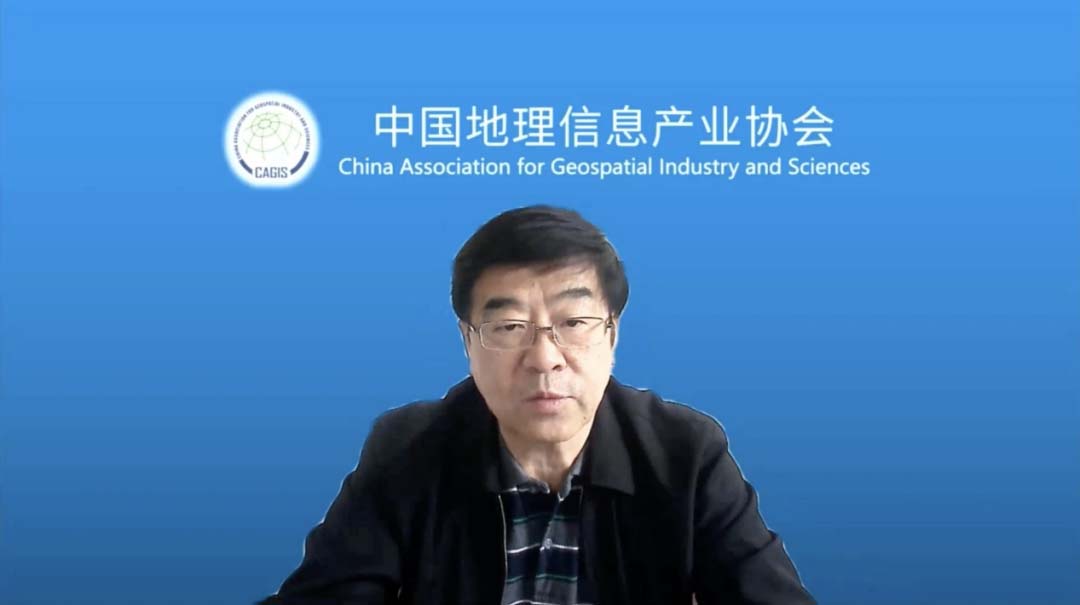
In his speech, President Ma Yunfei expressed that in this session of the Geospatial Industry Lecture, entrepreneurs made wonderful exchanges from various perspectives, including metaverse ecosystem design, new infrastructure potential, government metaverse, spatial data, human settlements, and the integrated development of digital twin cities. He hopes that through these exchanges and subsequent practices, the technologies related to the metaverse and digital new infrastructure can better exert their effectiveness in scenarios such as the cultural and tourism industry. He envisions more experiencers enjoying immersive and transcendent experiences in the cultural and tourism industry through metaverse and digital new infrastructure, allowing the digital ecosystem to enrich the lives of every individual.

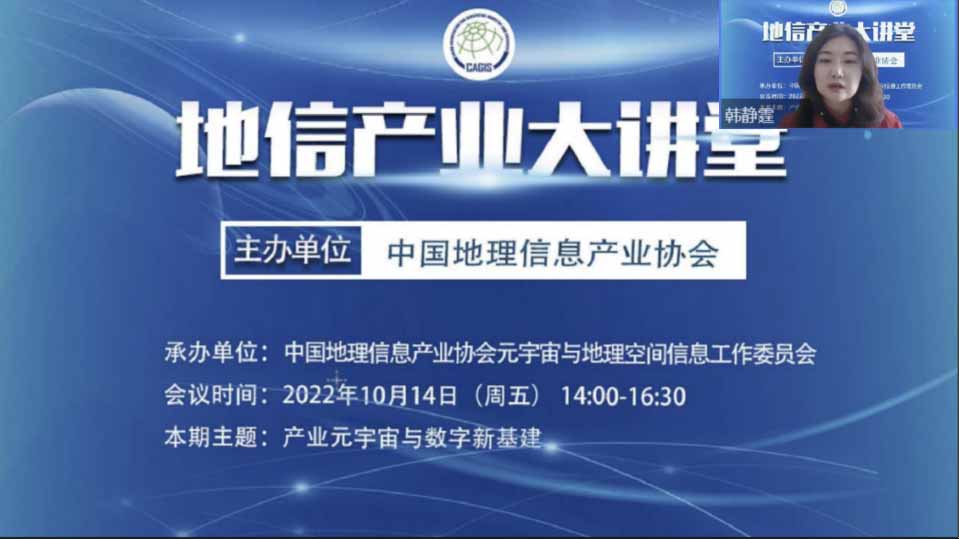
Vice Dean Qin Jingyan of the School of Artificial Intelligence at Beijing University of Science and Technology presented a topic titled "Design of Intelligent Services for Metaverse Digital Ecological Civilization." She stated that the metaverse, through the intelligent connection of all things, overlays and integrates the atoms of natural ecological carbon-based civilization with the bits of digital ecological silicon-based civilization, forming a new landscape of the digital ecological civilization across the entire domain. At the same time, it brings about accelerated changes in the development of global localization. The economy of intelligent benefits, intelligent life forms, intelligent production methods, intelligent and beautiful living culture, intelligent urban renewal, intelligent health competitions, and intelligent ecological civilization are all driving the world to undergo tremendous changes with a myriad of updates. Humanity has not only created a brilliant natural ecological civilization but also, in response to the times, should create a digital ecological civilization for digital existence with collective wisdom and the original intention of truth, goodness, and beauty. The aim is to shift the zero-sum game relationship of natural ecological civilization to a positive-sum game relationship in digital ecological civilization, ultimately achieving the goal of sustainable development.
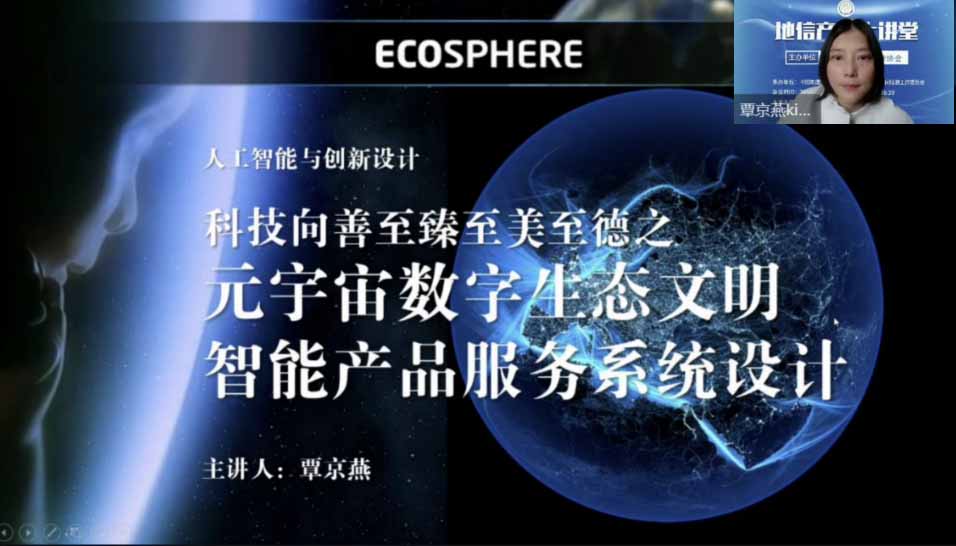
Qi Huanran, Vice President of Beijing Brilliant Technology Co., Ltd. and General Manager of Chengdu Brilliant Digital Intelligence Technology Co., Ltd., delivered a theme sharing titled "Industrial Metaverse: New Momentum for the Development of New Infrastructure." She stated that the industrial metaverse has gone through the stages of concept cultivation, solution architecture, piloting, and has now entered the exploration phase of overall implementation and construction. In terms of practical application and landing, the industrial metaverse projects that have been implemented focus on industry scenarios such as transportation, ports, energy, and cities, covering fields like public service management, community development, and intelligent building applications. Currently, Brilliant's digital twin technology has been applied in projects related to smart civil aviation, smart ports, smart highways, and smart parks, generating value for the business. In July 2022, Brilliant's digital twin operating system BLinkOS 2022.1 was officially released. This system includes platforms for digital twin scenario development, data integration and processing, and digital twin visualization tools. In the future, the digital twin visualization platform developed based on Brilliant's digital twin operating system BLinkOS will be applied to more Subdivided fields of new infrastructure, facilitating information interconnectivity between smart industries and promoting digital upgrades in various fields under the tide of new infrastructure.
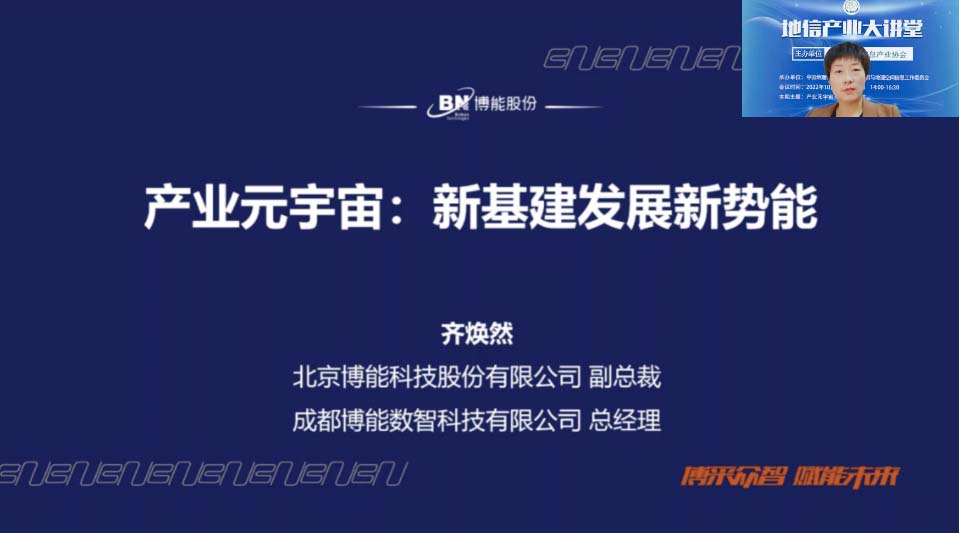
Wang Jing, the person in charge of the metaverse solutions at Kapuyun Information Technology Co., Ltd., presented on the topic of "Practice of Government Metaverse in Digital New Infrastructure." She stated that, thanks to the advancement of internet technology, we have conducted extensive practical explorations in the field of government affairs, attempting to present government authoritative releases and policy interpretations to the public in a more vivid and understandable manner. We are building online and offline government service businesses in virtual scenarios, using digital humans to guide, explain, answer questions, and review throughout the entire service process, significantly reducing the difficulty of service application and increasing the frequency of interactive communication. Additionally, we are engaging city recommendation officers to promote the city's historical culture and introduce investment attraction. By integrating more and more government service scenarios with metaverse-related technologies, we are leading the enhancement and transformation of government service capabilities with digital innovation.
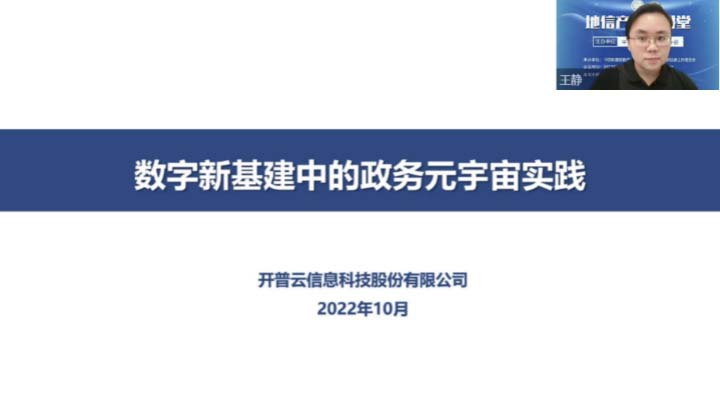
Wang Jiny, Vice President of China Electronics Technology Kingbase (Beijing) Technologies Inc., presented on the topic of "Spatial Databases Empowering Digital New Infrastructure." She stated that with the continuous advancement of new infrastructure business applications, geospatial information technology has become a core foundation for key industries such as energy, transportation, smart cities, and water conservancy projects, and has also injected new vitality into digital new infrastructure. As a member unit of China Electronics Technology Group Corporation, Renmin University JinCang takes the development of the domestic database industry as its mission, with the core of achieving technological innovation in spatial databases, the purpose of enhancing data security, and the support of leading product services. By combining the application needs of new infrastructure and the spatial database requirements of the geospatial information industry, Renmin University JinCang has created a comprehensive solution that includes intelligent migration, heterogeneous synchronization, data clustering, massive data analysis, and cloud databases. This solution has achieved comprehensive coverage from the vertical levels of ministries, provinces, cities, and counties, to the horizontal industries of new infrastructure such as electricity, oil, medical, and construction, as well as strong GIS industries like natural resources, emergency disaster reduction, ecological environment protection, water conservancy, and meteorology. This contributes to the sustained development of the digital new infrastructure industry.
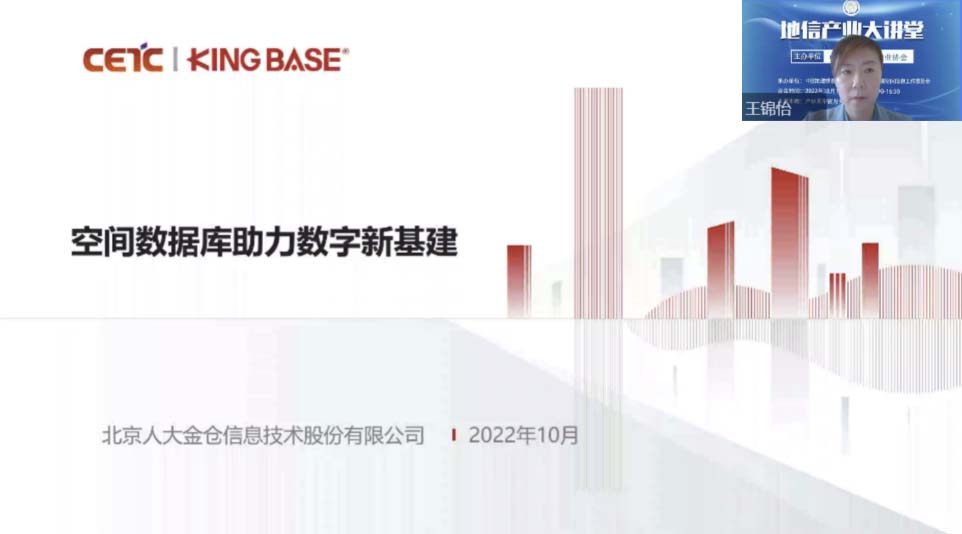
Professor Dang Anrong, from the School of Architecture and the Research Center for Human Settlements at Tsinghua University, and Director of the Human Settlements Information Laboratory, presented on the topic of "Metaverse Empowerment for a Better Human Settlement Environment Research." Professor Dang introduced the construction of the new era of ecological civilization's territorial spatial planning system in China and elaborated on the design research related to how the metaverse promotes the planning of a better human settlement environment, including core concept analysis, metaverse empowerment application scenarios, development opportunities, and trends. He shared the essential connotations and main characteristics of the three core concepts of territorial spatial planning, human settlement environment, and the metaverse, clarifying the multi-dimensional needs for research in the planning and design of a better human settlement environment. Then, he specifically discussed the application scenarios of the metaverse in macro, meso, micro, and various thematic fields in the planning and design of a better human settlement environment. Finally, based on new social development needs and new trends in information technology applications, he shared the development trends in the construction of a better human settlement environment.
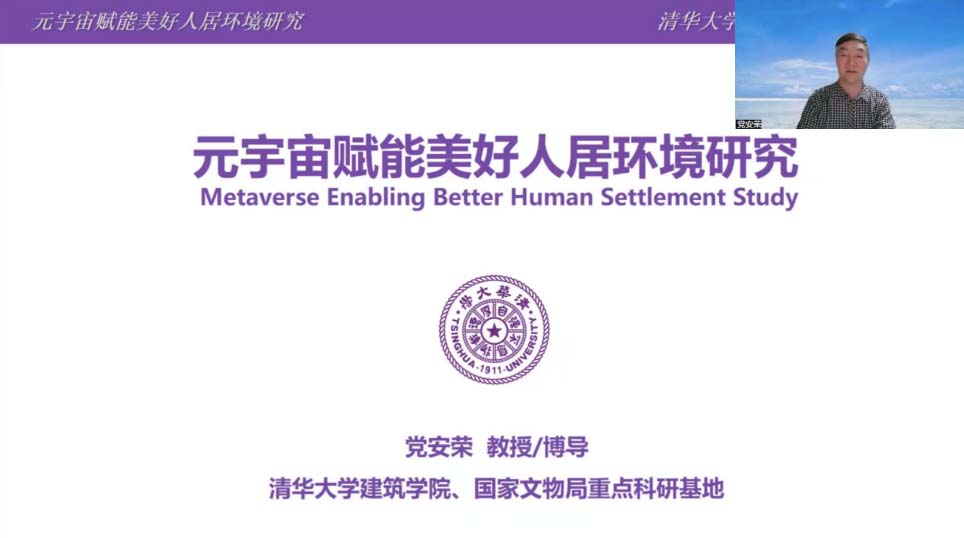
Liu Dan, Chief Expert for Digital Government at the Public Affairs Systems Department of Huawei Technologies Co., Ltd., Doctor, and Professor-Level Senior Engineer, presented on the topic of "Promoting the Integrated Innovation and Development of Digital Twin Cities Based on CIM in New Urban Construction." Mr. Liu stated that with the integration of new technologies such as 5G, AI, and blockchain, and the acceleration of urbanization in cities, the process of urban digitization has entered the era of digital twins characterized by full-scenario intelligence, full-domain collaboration, and full-domain perception. City Information Modeling (CIM) integrates multi-dimensional and multi-scale spatial data of the city's above-ground and underground, indoor and outdoor, historical and current data, as well as IoT Perception data.
.
In the practice of new urban construction and CIM pilot cities across the country, through top-level planning and standard guidance, the construction of various models and platform capabilities of the CIM basic platform, the integration support of ICT digital new infrastructure technologies, and the traction of multiple CIM application scenarios, CIM-based new urban construction has become the best path to promote the innovative development of digital twin cities. It will truly create a digital twin city intelligent life form that is cognizable, learnable, imaginable, decidable, and actionable.
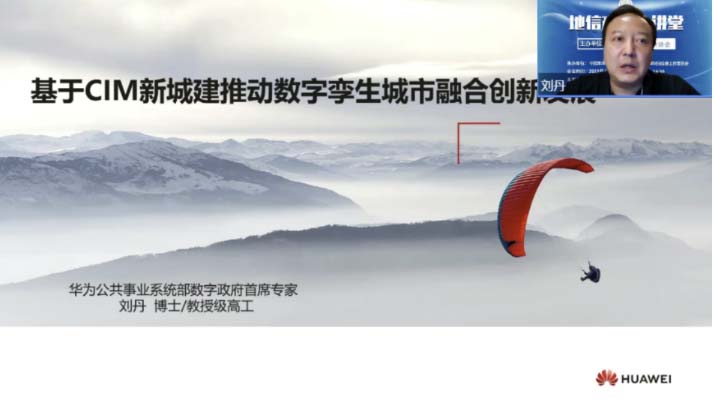 This session of the Geospatial Industry Lecture has garnered widespread attention from the industry, with multiple media platforms broadcasting live simultaneously, attracting a large number of viewers to watch online. Subsequently, the lecture will facilitate multi-party communication and collaboration through report sharing, strengthen the integration and sharing of advantageous resources, and provide a broader and higher-quality learning and communication platform for geoinformation practitioners. This will contribute to promoting enterprise transformation and upgrading, and leading the high-quality development of the industry. Since its launch, the "Geospatial Industry Lecture" has been committed to tracking industry hotspots, interpreting policies and regulations, sharing cutting-edge technologies, and showcasing the latest achievements, which has received widespread attention from all sectors of the industry, with its influence and attention continuously increasing.
This session of the Geospatial Industry Lecture has garnered widespread attention from the industry, with multiple media platforms broadcasting live simultaneously, attracting a large number of viewers to watch online. Subsequently, the lecture will facilitate multi-party communication and collaboration through report sharing, strengthen the integration and sharing of advantageous resources, and provide a broader and higher-quality learning and communication platform for geoinformation practitioners. This will contribute to promoting enterprise transformation and upgrading, and leading the high-quality development of the industry. Since its launch, the "Geospatial Industry Lecture" has been committed to tracking industry hotspots, interpreting policies and regulations, sharing cutting-edge technologies, and showcasing the latest achievements, which has received widespread attention from all sectors of the industry, with its influence and attention continuously increasing.